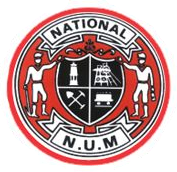
The National Union of Mineworkers (NUM) is a trade union for coal miners in Great Britain, formed in 1945 from the Miners' Federation of Great Britain (MFGB). The NUM took part in three national miners' strikes, in 1972, 1974 and 1984–85. Following the 1984–85 strike, and the subsequent closure of most of Britain's coal mines, it became a much smaller union. It had around 170,000 members when Arthur Scargill became leader in 1981, a figure which had fallen in 2023 to an active membership of 82.

The National Coal Board (NCB) was the statutory corporation created to run the nationalised coal mining industry in the United Kingdom. Set up under the Coal Industry Nationalisation Act 1946, it took over the United Kingdom's collieries on "vesting day", 1 January 1947. In 1987, the NCB was renamed the British Coal Corporation, and its assets were subsequently privatised.

The Coal strike of 1902 was a strike by the United Mine Workers of America in the anthracite coalfields of eastern Pennsylvania. Miners struck for higher wages, shorter workdays, and the recognition of their union. The strike threatened to shut down the winter fuel supply to major American cities. At that time, residences were typically heated with anthracite or "hard" coal, which produces higher heat value and less smoke than "soft" or bituminous coal.
The Miners' Federation of Great Britain (MFGB) was established after a meeting of local mining trade unions in Newport, Wales in 1888. The federation was formed to represent and co-ordinate the affairs of local and regional miners' unions in England, Scotland and Wales whose associations remained largely autonomous. At its peak, the federation represented nearly one million workers. It was reorganised into the National Union of Mineworkers in 1945.
Colonel Claude Granville Lancaster was a British Army officer, coal industry director, and Conservative Party politician.
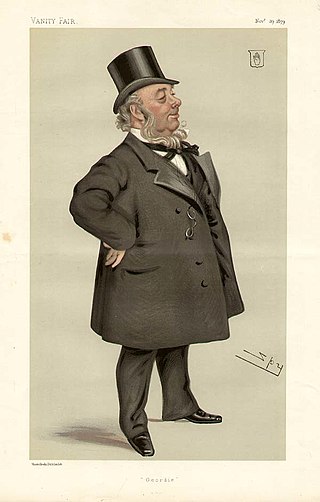
Sir George Elliot, 1st Baronet, JP was a mining engineer and self-made businessman from Gateshead in the North-East of England. A colliery labourer who went on to own several coal mines, he later bought a wire rope manufacturing company which manufactured the first Transatlantic telegraph cable. He was also a Conservative Party Member of Parliament (MP).
This article is about the particular significance of the year 1837 to Wales and its people.
The Hewitt Baronetcy, of Barnsley in the West Riding of the County of York, is a title in the Baronetage of the United Kingdom. It was created on 15 January 1921 for Joseph Hewitt.
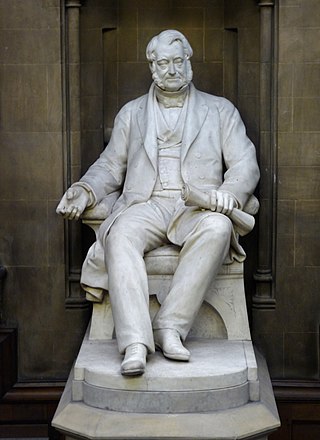
Nicholas Wood was an English colliery and steam locomotive engineer. He helped engineer and design many steps forward in both engineering and mining safety, and helped bring about the North of England Institute of Mining and Mechanical Engineers, holding the position of president from its inauguration to his death.
The Thursby Baronetcy, of Ormerod House in the Parish of Burnley in the County Palatine of Lancaster and of Holmhurst in the Parish of Christchurch in the County of Southampton, was a title in the Baronetage of the United Kingdom. It was created on 26 July 1887 for John Hardy Thursby, then honorary colonel of the 5th Battalion, East Lancashire Regiment.
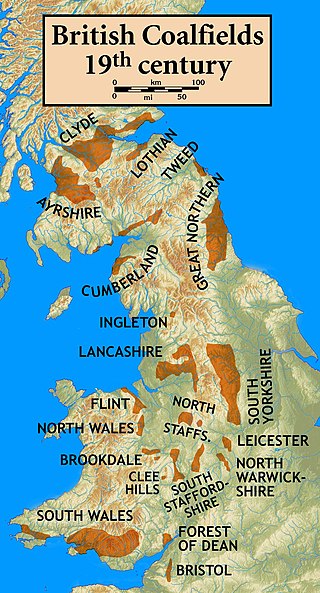
Coal mining in the United Kingdom dates back to Roman times and occurred in many different parts of the country. Britain's coalfields are associated with Northumberland and Durham, North and South Wales, Yorkshire, the Scottish Central Belt, Lancashire, Cumbria, the East and West Midlands and Kent. After 1972, coal mining quickly collapsed and had practically disappeared by the 21st century. The consumption of coal—mostly for electricity—fell from 157 million tonnes in 1970 to 18 million tonnes in 2016, of which 77% was imported from Colombia, Russia, and the United States. Employment in coal mines fell from a peak of 1,191,000 in 1920 to 695,000 in 1956, 247,000 in 1976, 44,000 in 1993, 2,000 in 2015, and to 360 in 2022.
Sir James Bowman, 1st Baronet, was a British trade unionist.
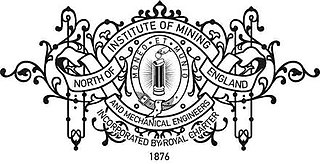
The North of England Institute of Mining and Mechanical Engineers (NEIMME), commonly known as The Mining Institute, is a British Royal Chartered learned society and membership organisation dedicated to advancing science and technology in the North and promoting the research and preservation of knowledge relating to mining and mechanical engineering. The membership of the institute is elected on the basis of their academic and professional achievements with Members and Fellows entitled to the postnominal MNEIMME and FNEIMME. The Institutes’ membership is predominantly from local industry and from academics at Durham and Newcastle Universities, though members are also located further afield across the UK.

Sir David Dale, 1st Baronet, was an English industrialist. He died as chairman of the Consett Iron Company and the mining firm Pease & Partners, and as a director of the North Eastern Railway Company. Dale owes his main distinction to his pioneer application of the principle of arbitration to industrial disputes.
Sir Evan Williams, 1st Baronet, of Glyndwr was a Welsh industrialist. As Chairman of the Monmouthshire and South Wales Coalowners Association and later President of the Mining Association of Great Britain, he exerted considerable influence on the mining industry in the UK.
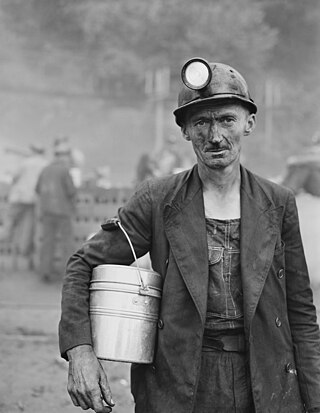
People have worked as coal miners for centuries, but they became increasingly important during the Industrial revolution when coal was burnt on a large scale to fuel stationary and locomotive engines and heat buildings. Owing to coal's strategic role as a primary fuel, coal miners have figured strongly in labor and political movements since that time.
Amritlal Ojha (1890–1944) was a noted coal miner and businessman from Calcutta, India.

The Monmouthshire and South Wales Coal Owners' Association (MSWCOA) was an association of mine owners in South Wales that was active between 1873 and 1955. It fought wage increases, safety regulations, unionisation and other changes that would cut into profits. It managed to link miners wages, which were based on piece-work, to the price of coal. It was involved in various labour disputes, including a lengthy strike in 1926. The coal mines became unprofitable in the 1930s and were nationalized in 1947, making the association irrelevant.

The Coal Mines Act 1911 amended and consolidated legislation in the United Kingdom related to collieries. A series of mine disasters in the 19th and early-20th centuries had led to commissions of enquiry and legislation to improve mining safety. The 1911 Act, sponsored by Winston Churchill, was passed by the Liberal government of H. H. Asquith. It built on earlier regulations and provided for many improvement to safety and other aspects of the coal mining industry. An important aspect was that mine owners were required to ensure there were mines rescue stations near each colliery with equipped and trained staff. Although amended several times, it was the main legislation governing coal mining for many years.

John Storey Barwick, 1st Baronet of Ashbrooke Grange, J.P., (1840–1915), was an English industrialist involved within quarries, coal-mining, shipping and shipbuilding concerns. He was founder of Easington Colliery in 1899 then known as The Easington Coal Company Limited a privately owned company of which he was chairman. Barwick was made first baronet of Ashbrooke Grange in 1912.